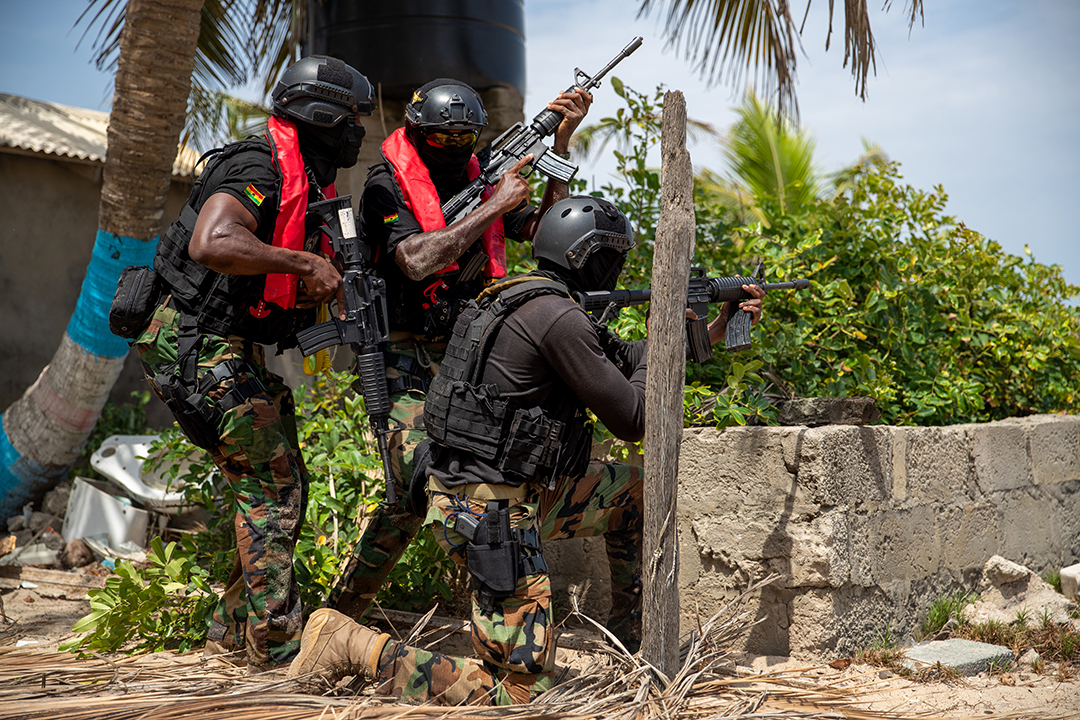Stopping the Spread of Terrorism a Focus of Flintlock ’23
ADF STAFF
The spread of extremist violence in West Africa gave this year’s Exercise Flintlock an air of urgency, as counterterrorism training took center stage.
Ghana Armed Forces Col. Richard Mensah, commander of the Joint Military Headquarters for Flintlock 2023, linked the regional situation to the exercise.
“The global threat to terrorism is real, and we need to be ready now because special operations are not created during emergencies,” he said during a news briefing.
“The main aim of the exercise is to build partnerships, train and get ready for any threats. We are also strengthening partnerships with our West African counterparts.”
Hosted by Ghana and Cote d’Ivoire from March 1-15, Exercise Flintlock brought together about 1,300 participants from 29 nations to improve military capabilities, partnerships, interoperability and communication.
Flintlock, which started in 2005, is the United States Africa Command’s largest annual special operations exercise on the continent.
Fifteen African nations participated, including several that are currently grappling with terrorism and other extremist violence — Burkina Faso, Cameroon, Chad, Côte d’Ivoire, Ghana, Libya, Niger, Nigeria, Senegal and Togo.
In the Sahel, extremist groups linked to al-Qaida and the Islamic State group have killed thousands and displaced millions. In 2022, insurgent violence increasingly spilled from Burkina Faso into the northern territories of nations along the Gulf of Guinea.
In Ghana, the northern region has seen attacks rise from one in 2021 to 19 in 2022, according to the Armed Conflict Location & Event Data Project. The government has not categorized these attacks as incidents of terrorism but has warned of the possibility of extremist violence in the country.
During Flintlock, U.S. Special Operations Command Africa Commander Rear Adm. Jamie Sands praised the work and progress that countries such as Ghana and Côte d’Ivoire have made in preparing to face violent extremist attacks.
“Our partners in coastal West Africa are resilient,” he said during a virtual news conference on March 13. “They’re capable and they’re absolutely aware of the threat. And so I’m confident in their ability to stem the threat and be prepared to address it as it comes perhaps from the north.”
Military and police personnel used the two-week Exercise Flintlock to improve their security response capacity with tactical training, drills in sea protection, piracy attack rescue and crew rescue and protection.
In a first for Flintlock, there was a dedicated maritime training site where military forces practiced search and seizure and other strategies to combat piracy in the Gulf of Guinea.
Ghanaian military officials such as Army Col. William Nortey have expressed concern over the potential of terror groups collaborating with pirates.
“We already know that they have intent to link up with piracy and enhance operations,” he said during Flintlock. “That would be a game changer for the littoral [coastal] states, so we need to prevent this at all costs.”
Ghana has invested heavily in border security, purchasing more than 100 armored personnel carriers and other military equipment, President Nana Akufo-Addo said.
“The reality of the state of affairs in our neighborhood demands that the government goes to great lengths to ensure the security, safety and stability of our nation,” he said in his State of the Nation address on March 8.
“The threats of terrorism and violent extremism surrounding us require that we pay maximum attention to protecting our borders and working in collaboration with our neighbors to keep our country and the region safe.”
Mensah and other Gulf of Guinea security professionals were determined to use Exercise Flintlock and some of its academic forums to explore non-military approaches as well.
“We can’t always use kinetic means to defeat terrorist activities,” he said, “but we can involve other non-security sectors to win the hearts and minds of the local population to fight security challenges within the region.”


Comments are closed.